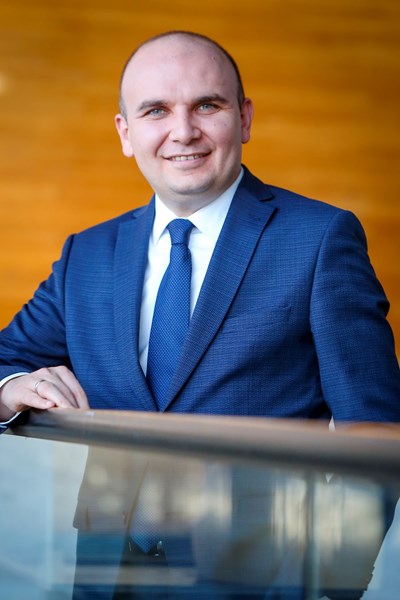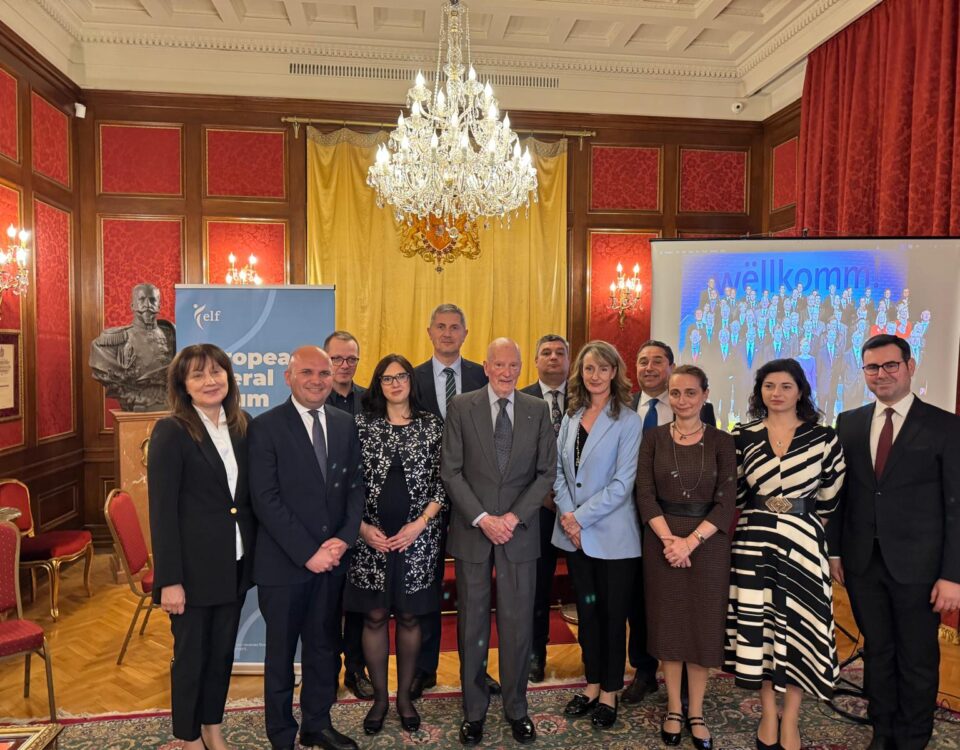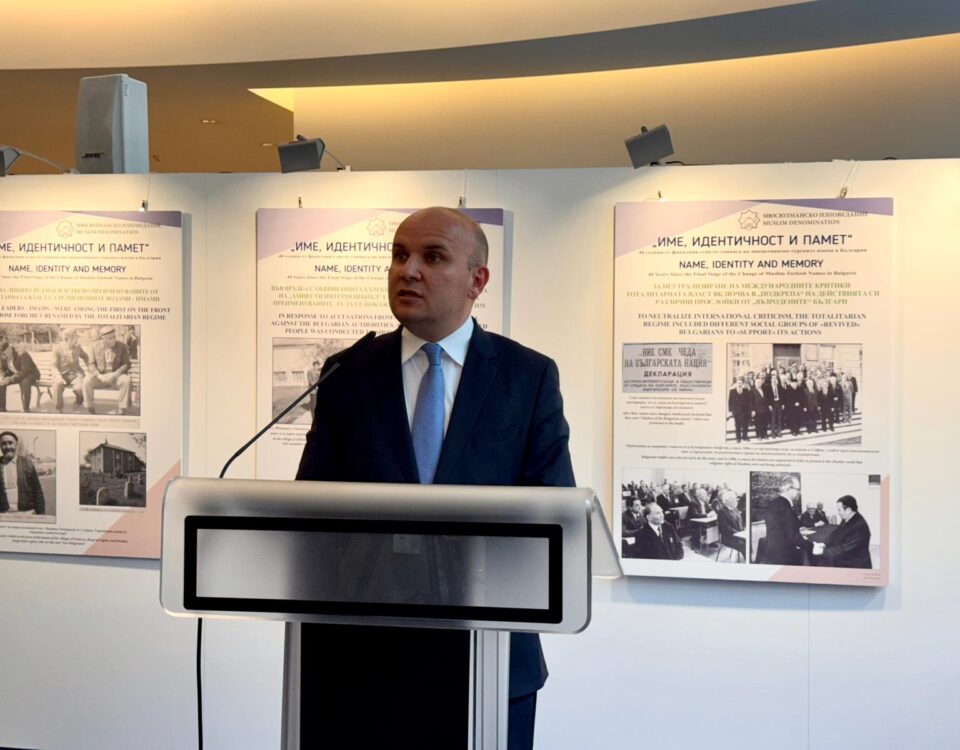
The Foreign Ministry of Azerbaijan awarded Ilhan Kyuchuk with an honourary medal
December 16, 2019
MEP Ilhan Kyuchuk: In any European country, the cynic Simeonov would have long been history!
December 16, 2019Highlights from the interview with the MRF/Renew Europe MEP:
The Western Balkans cannot be in the waiting room of the EU, but an integral part of the EU itself;
Bulgaria met the criteria for Schengen membership but that is also a matter of political confidence. Our liberal partners are concerned from the entrusting of key ministries in the security field to representatives of the extremeright nationalists.
Mr. Kyuchyuk, you were appointed as the main rapporteur of the European Parliament for Northern Macedonia for the upcoming 5 years. This is a recognition for you no Bulgarian MEP has been a rapporteur on such an important file so far, but can it be interpreted as well as a sign for Bulgaria?
I have always said that the success of any Bulgarian citizen is a success for Bulgaria as well. I firmly believe that politics is made in the name of generations to come. Guided by this principle, I will monitor and evaluate the progress made impartially, based on the results achieved. Northern Macedonia has been undergoing heavy reforms and has done a lot in the name of the EU membership. The country made as well just as heavy compromises, showing a political courage and vision in the name of good neighborly relations, repeatedly proving that it belongs to the European family.
What will you be doing now after the European Council refused to start membership talks with Northern Macedonia and Albania? What is the scenario from here on?
The European Parliament and the European Commission have expressed their strong and unequivocal support for the enlargement policy. However, the European Council was of a different opinion and I expect this decision to be reviewed soon. For some time now, there has been talk of a change in the Copenhagen criteria but without much specificity no one has seen a proposal for such a change. What would it look like, how it would be implemented? Will it also affect the countries that have already started preaccession negotiations such as Serbia and Montenegro? Before the EUWestern Balkans Summit in Zagreb, all three institutions need to have a consolidated and unambiguous position on this issue. The Western Balkans cannot be in the EU’s waiting room, but an integral part of the EU itself.
Think of Bulgaria in the early 1990s, which, with several former communist states, stood as the “black hole” of Europe. But through internal political changes, joint efforts and reforms, we were able to join NATO in 2004 and a little later, the EU in 2007.
We are marking the 30th anniversary since the fall of the communist regime how do you assess this period and the undergone transition?
Bulgaria managed to make a peaceful transition from totalitarism to democracy thanks to the unique ethnic model designed by Dr. Ahmed Dogan. Our country was united by the common consensus cause for European development expressed in NATO and EU membership, and succeeded in realizing it. Unfortunately, during the past 10 years Bulgaria has had no clear priorities, strategy and direction, and moves chaotically in inertia. We have become the poorest and most depopulating nation. In many cases, we do not seek or find our place in the EU and the international organizations to which we are members, and strategic decisions are made ad hoc without a guiding vision. It is alarming that 30 years after the fall of the Berlin Wall, new walls are being built between people based on hate speech.
The EC report recommended that the monitoring for Bulgaria be dropped. Did inquire your colleagues in the EP what is their opinion on that matter?
We have always emphasized that the Cooperation and Verification Mechanism is ineffective with a view to achieving lasting change, it is with limited scope and is therefore unfair. The mechanism applies to Bulgaria and Romania, and no such measures were taken against the countries with similar problems that acceded before us or even the later acceded Croatia. Unfortunately, there are still way too many rule of law instruments which are only applied regionally or sectorally.
We insist on the establishment of a rule of law mechanism, applied on an equal footing to all Member States. Already in 2016, the EP supported a report in this regard by my colleague from the liberals Sophie Int’ Veld on the creation of a pact on democracy, the rule of law and fundamental rights, which would integrate the existing instruments and ensure equal treatment for all. The difficulties in applying Art.7 of the TEU was an additional alarm signal for the need for this instrument and we are all looking forward to concrete action by the EC in this regard.
Is the elimination of monitoring a step towards Schengen, as your colleagues predicted?
Bulgaria must be part of the Schengen area and this is one of the main positions of the MRF. Our country has long fulfilled the criteria for membership; we have access to the European border security systems as well. But the Schengen membership is also a matter of political confidence. For example, our liberal partners express grave concerns about the entrusting of key ministries in the security field to representatives of the extremeright nationalists.
What are your expectations for the new EC in your opinion, having observed its formation will it be effective?
The fact that the EC constituted later does not represent a precedent. The European Parliament has enough control tools, and this became evident in the hearings of three of the commissionersdesignate. And they can be activated when there is political will. We are faced with important questions which are awaiting their legislativ esolutions. We expect the College of Commissioners to be constituted by the end of the month.
The UK’s exit date from the EU is constantly being extended. Brexit has already been identified as Britain’s biggest mistake since World War II. When and how can this agony come to an end?
The last one stage of Brexit is a textbook example of how the lack of consensus between the two main forces could put a country in a severe political and constitutional crisis. The position of the EU is unchanged on this matter. With one exception this time we will first wait for London’s decision. So far the opposite has been the case. There are important elections to be held on the 12th December in the UK, which will give greater clarity on the follow up actions.
You were recently reelected Vice President of ALDE, with the highest score of votes. What are the highlights of your work as such?
The result I received is above all an international recognition for the consistent policy of the MRF. Over the years, we have established ourselves as one of the most stable and developing parties in Eastern Europe. And as a member of the Bureau, I will continue to work to support and promote liberalism.
What is your assessment of the MRF’s results in the local elections?
The MRF consolidated its position and expanded its geography in local government. The results show that there is an increase in the number of seats 47 mayors of municipalities, 37 of whom are MRF candidates, 9 supported as a coalition and 1 independent. 916 municipal councilors from the MRF were also elected or approximately 18% more. We consider this as a huge trust but also a responsibility.




